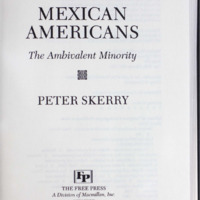-
Title
-
Mexican Americans : the ambivalent minority
-
Description
-
Some of us have been here for three hundred years, some for three days. This comment, often repeated by Mexican Americans, affirms their status as one of America's oldest ethnic groups, as well as one of its newest and fastest growing. Not surprisingly, many observers (including some Mexican Americans) are concerned about the impact of the burgeoning number of Mexican immigrants on our society - anxieties exacerbated by leaders whose demands for bilingual schools and ballots challenge the goal of assimilation.
-
Identifier
-
444906
-
29291321
-
Creator
-
Skerry, Peter
-
Source
-
Brian Lamb Booknotes Collection
-
Gift of Brian Lamb, 2011.
-
Catalog record
-
Language
-
eng
-
Date
-
1993
-
Program air date: October 3, 1993.
-
Publisher
-
Free Press
-
George Mason University. Libraries. Special Collections & Archives
-
Text
-
Transcription of Annotations
Notes on front endpapers: Two Columns Texas and CA. Texas: Catholic Church; Willie Velasquez; Saul Alinsky--Industrial Areas Foundation; Henry Cisneros; Gloria Molina; Ceasar Chavez. California: little racial discrimination; V.O. Ken's Southern Politics. Underlinings/notes: Acknowledgements include Willie Velasquez, Linda Chavez and others. Mexican-Americans that do not speak Spanish. SW people who built area were Hispanics. Americans regard bilingula ballots not as voting rights, but way for Mexican-American leaders to keep people isolated into barrio. Quebec? No! Liberals. Conservatives--Mexicans reinforcements in battle for traditional values. Civil Rights strategy. Velasquez knew of author's Irish-Catholic roots. Velasquez died of cancer in 1988, age 44. Will Mexican Americans define themselves as traditional ethnic immigrants or as victems of racial discrimination?Book title: Mexican-Americans: the ambivalent minority--Latino's cannot make up their minds whether they're a minority. Nongovernmental institutions disposed toward designating Mexican Americans a minority. Ernesto Cortes attended triaing course at Saul Alinsky's Industrial Areas Foundation (IAF) in Chicago in the 1970s; returned to San Antonio. Alamo. Chicano in vogue in 1960s. Latino popular in Los Angeles. Hispanic generic viewed by Mexican-Americans as label concoted by federal bureaucrats. Mexicano. Mexican-American. COPS in San Antonio; UNO in Los Angeles. Interviews/participant-observer at community meetings, political rallies, parish meetings, etc. Henry Cisneros. San Antonio is a big small town. Tables of Hispanic State Legislators in California and Texas 1930-1993. Mexican Americans have done better politically in San Antonio and Texas than in Los Angeles and California. Friends-and-neighbors politics. Three Panchos. UNO not heavily involved in electoral politics. East LA machine. California deterioration of link between ethnic/geographical community. Seen ion California as a racial minority. Mexican Americans as White v. blacks. Rockefeller/Ford Foundations. No single, overriding Mexican-American interest. MALDEF. Chicano studies. Many students do not consider themselves minority or Mexican before arriving on campus. Mexican Americans assimilating. Argument of book: Mexican Americans being seduced by political system into adopting stance of racial minority will raise objections as will comparison with blacks.
-
Subject
-
"Mexican Americans--Politics and government."
-
"Mexican Americans--Texas--San Antonio--Politics and government."
-
"Mexican Americans--California--Los Angeles--Politics and government."
-
Relation
-
Original Booknotes interview
-
Rights
-
This work may be protected by copyright laws and is provided for educational and research purposes only. Any infringing use may be subject to disciplinary action and/or civil or criminal liability as provided by law. If you believe that you are the rights-holder and object to Mason’s use of this image, please contact speccoll@gmu.edu.
 444906.pdf
444906.pdf